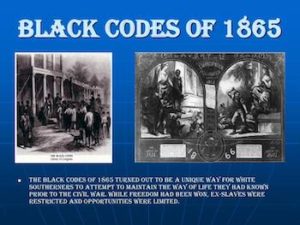
*On this date in 1832, we acknowledge Black Codes in the United States. Sometimes called Black Laws, Black Codes were (are) laws governing the conduct of Black people during slavery and after emancipation.
Southern states passed the best example in 1865 and 1866 after the American Civil War to restrict African Americans' freedom and require them to work for low wages. However, Black Codes existed before the Civil War, and many Northern states had them. During slavery, in most of America, there was a distinction when it came to political privileges between free white persons and free colored persons of African blood, and in no part of the country did Black people participate equally with the whites in the exercise of civil and political rights.
Since the adoption of the Articles of Confederation, Black Codes have been part of a larger racist pattern of white leverage to maintain political dominance and suppress the freedmen and newly emancipated Black slaves. Black codes were essentially replacements for slave codes in those colonies, which became states. Since the colonial period, colonies and states had passed laws that discriminated against free Blacks. In the South, these were generally included in "slave codes"; the goal was to reduce the influence of free blacks (particularly after slave rebellions) because of their potential impact on slaves. Restrictions included prohibiting them from voting (although North Carolina had allowed this before 1831), bearing arms, gathering in groups for worship, and learning to read and write. A significant purpose of these laws was to preserve slavery in slave societies.
Before the war, Northern states that had prohibited slavery also enacted Black Codes: Connecticut, Ohio, Illinois, Indiana, Michigan, and New York passed laws to discourage free Blacks from residing in those states. They were denied equal political rights, including the right to vote, the right to attend public schools, and equal treatment under the law. Some Northern states repealed such laws when the Civil War ended, and slavery was abolished by constitutional amendment.
In the first two years after the Civil War, white-dominated Southern legislatures passed Black Codes modeled after the earlier slave codes. They were particularly concerned with controlling the movement and labor of freedmen, as a free labor system had replaced slavery. Although freedmen had been emancipated, their lives were greatly restricted by the Black Codes. The term Black Codes was given by "negro leaders and the Republican organs," according to historian John S. Reynolds.
From a 21st-century perspective, a defining element of Black Codes was (is) broad vagrancy law, which allowed local authorities to arrest freed people for minor infractions and commit them to involuntary labor. This period was the start of the convict lease system, also described in the 2008 book "Slavery by Another Name" by Douglas Blackmon.